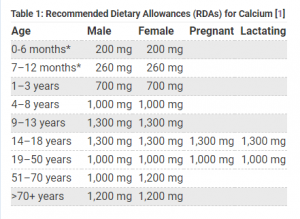Aside from its several functions in the human body, recent studies have revealed that calcium – which is the most abundant mineral in the human body (1) – can also play a key role in sleep.
Overview
In this article, we will talk about the role of calcium in sleep thoroughly and explain how this mineral might play a key role in sleep.
However, before going into details, let’s reveal the main reason why calcium is thought to be good for sleep…
Calcium helps the brain to use tryptophan which is necessary for the production of melatonin, which promotes sleep at night (2),(3).
If you would like to know how exactly this essential mineral encourages sleep, please keep on reading.
Calcium and Sleep
It is well known that calcium is indispensable for both bones and teeth, and also has many functions in the human body.
Growing evidence points out that calcium deficiency can cause insomnia (4),(5),(6).
That is to say, a sufficient amount of calcium in the body can reduce the risk of developing insomnia, a common sleep problem in which people have trouble falling and staying asleep or both (7),
The Relationship Between Calcium And Sleep
It is important to underline the fact that calcium doesn’t directly help sleep. As mentioned above, it helps the brain to use tryptophan to produce melatonin, the sleep-promoting substance (8),(9),(10).
Sleep expert Luis Fernando Buenaver from Johns Hopkins says; Melatonin doesn’t make you sleep, but as its levels rise in the evening it puts you into a state of quiet wakefulness that helps promote sleep,” (11).
So, we now know that calcium helps the brain produce melatonin, the sleep-promoting hormone.
What Do Experts Say About Calcium and Sleep?
“ Calcium helps the brain use the amino acid tryptophan to manufacture the sleep-inducing substance melatonin. This explains why dairy products, which contain both tryptophan and calcium, are one of the top sleep-inducing foods,” says Dr William Sears: “ (2),(3)
Speaking of sleep-inducing foods; cow’s milk, eggs, almonds and almond milk can be given as examples owing to the fact that they contain both tryptophan and calcium.
According to James F. Balch, M.D. and author of “Prescription for Nutritional Healing: “ A lack of the nutrients calcium and magnesium will cause you to wake up after a few hours and not be able to return to sleep,” (3).
Related Studies
As we mentioned at the beginning, there are studies, showing a strong positive correlation between calcium and sleep quality.
Let’s review a couple of these studies.
1-) In one study, published in 2014, researchers discovered that calcium ( along with a couple of other specific dietary nutrients such as vitamin D and selenium can make falling asleep easier.
Moreover, as per the findings of the same study, another potential benefit of calcium is to help individuals to stay asleep.
2-) A more recent study published in European Neurology Journal, mentioned in Medical News Today, suggests that calcium deficiency can cause sleep disruptions.
Especially, disturbed REM ( rapid eye movement ) deep sleep is related to calcium deficiency, according to the study.
Daily Allowance of Calcium
According to The National Institute of Health’s Office of Dietary Supplements, the daily intake of calcium should be as follows:

Note: Calcium, taken from natural sources is more effective than calcium supplements, at least in terms of protecting bone health, according to Washington University School of Medicine (12).
Best Calcium Sources
Calcium is essential and has many functions in the human body, as we mentioned repeatedly thus far.
If you are concerned that your daily calcium intake is not enough, therefore, want to increase your daily consumption, the below-given foods can help you boost the calcium stores in your body.
- collard, broccoli, kale, dried figs
- sardines canned with bones
- salmon canned with bones
- dairy products
- ( fortified ) almond milk, soy milk
- almonds ( can also help you sleep )
“The human body is better able to absorb calcium from food than it can from supplements, ” says, helpguide.org (13).
Moreover, we shouldn’t forget the importance of vitamin D. Because, vitamin D is necessary for the proper absorption of calcium (14).
Final Thoughts
Although the effect of calcium on sleep is positive ( we know that based on the studies and experts’ opinions that we have cited throughout the article), having enough calcium in your body can’t guarantee you a good night’s sleep.
This is because sleep is a delicate process and various factors can affect it.
For instance stress, noise, and the high/cold temperature of your bedroom can easily disrupt your sleep.
Having said that, it is important to underline that the amount of calcium in your body may affect your sleep either positively or negatively based on whether you have enough or not enough calcium in your body.
In short, this essential mineral seems to be one of the factors that are required to get a good night’s sleep.
Not only calcium though, but other essential minerals or vitamins can also affect both sleep quality and quantity.
There are even healthy foods that are known to disrupt sleep when eaten close to bedtime.
That brings us to the fact that diet also plays a significant role in sleep.
In this article, we discussed the effect of only one particular nutrient, namely calcium.
Who knows increasing your daily calcium intake ( to the recommended level ) can increase your sleep quality?
Tarkan is an experienced health writer ( currently more than 600 articles ) and also the founder of this website namely www.neededforhealth.com. His expertise in health stems from in-depth medical research and knowledge which he obtained over the course of many years.
Tarkan enjoys sharing factual knowledge on health, psychology and nutrition. He always aims to deliver evidence-based recommendations, provide links to related scientific studies.
tarkanivgen41@gmail.com





